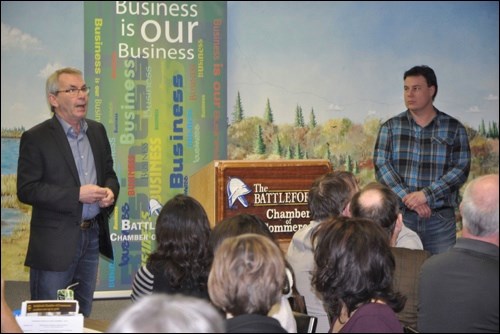The 2015 City budget has been adopted, and now the city is busy selling the budget to the constituents.
Wednesday saw officials from City Hall meet the Battlefords Chamber of Commerce in a noon-hour luncheon, in which the budget was the prime topic of discussion.
Mayor Ian Hamilton delivered the budget address to the Chamber during a presentation that featured few surprises, given the budget process wrapped up several weeks ago. Several city officials, including City Manager Jim Puffalt, City Finance Director David Gillan and other members of council and administration, were also present.
Hamilton spent much of his address touting the initiatives and accomplishments of the past year before going into the details of the budget.
Those included a “special tax” going to asphalt repairs in the city.
That tax, which is estimated to cost property taxpayers an additional $12.50 per month on average, is in addition to increases of 4.5 per cent to the property tax as well as a five per cent water base and three per cent sewer base increase.
Hamilton defended the special tax as necessary to address the infrastructure needs of the city.
He explained the current rate of underground pipe replacement was not enough, and that the two senior levels of government were “offering only a fraction of the costs” to deal with the issue.
“We are essentially left to address this problem on our own,” said Hamilton.
The mayor explained a special tax based on foot frontage across the entire city would spread the burden more equitably, and also confirmed the special tax would be expanded in coming years.
Hamilton also spoke of the rationale for the early adoption of the budget in December, which he said would “allow administration to hit the ground running as operations resume (this year).”
He noted the addition of in-house engineering services at City Hall would allow “the proactive development of tendering documentation,” which he said would not only save significant consulting fees, but result in projects on the ground earlier and at better and more competitive value.
The impact of the special tax, and rising taxes in general, was a concern of Chamber members during budget deliberations.
But there was noticeably little opposition expressed and few questions from the audience of about 45 people at the luncheon.
The only question came from Chamber Executive Director Linda Machniak, who wanted some details on the impact of the special tax on properties normally exempt from property tax.
Mayor Hamilton confirmed those normally tax-exempt properties would have to pay the special tax. Those include churches, health facilities and school properties.
Hamilton also explained the decision for the special tax to be based on $3 per foot frontage as opposed to an approach based on assessment, saying the latter was seen as “quite inequitable in many respects.”
In speaking to reporters Hamilton said he believed people understood why the special tax was needed.
“I do believe that the very in-depth debates and discussions that were held during the budget deliberations, and reported upon by the media, have been very effective in getting the message out to the community at large, and especially the business community. I think they understand it. No one likes it necessarily, but these are the realities.”


.png;w=120;h=80;mode=crop)

